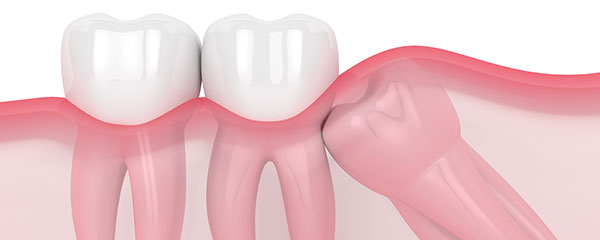Why Should Wisdom Teeth Be Removed?
Wisdom teeth are the last set of molars in your jaw. They usually start to emerge in your late teens, and they’re a common cause of tooth, gum and jaw problems.
Your wisdom teeth are vestigial – they’re an unnecessary feature that doesn’t have an impact on your jaw function. That means they can be removed if they cause problems.
That’s good, because research shows that over 70% of young people have some sort of defect with at least one of their wisdom teeth.
While wisdom tooth removal is common, it’s considered a major surgery, and should only be done on the advice of your dentist.
In this article, we’ll discuss common problems with wisdom teeth, why they may be removed, and how the procedure works.
Wisdom Teeth Removal (Extraction)
Wisdom teeth are the third set of molars in your jaw. They are the last set of adult teeth to come through your gums, usually erupting between the ages of 17 and 25.
The challenge for most of us is that our jaws aren’t big enough to accommodate a third set of molars. This can cause wisdom teeth to become “impacted”. That is, they don’t erupt through the gum and may grow at a strange angle, which can affect the surrounding teeth and tissue.
If you experience a problem, a dentist or oral surgeon may recommend removing one or more wisdom teeth.
Wisdom teeth extractions can be performed in-chair by your dentist. The procedure can also be performed under twilight sedation or general anaesthesia by an oral surgeon.
Concerned About Your Wisdom Teeth? Book a Consultation With Camira Dental
Impacted, damaged or unhealthy wisdom teeth can cause serious pain and infections. If you are concerned about your wisdom teeth, book a consultation with Camira Dental and we can help you decide what to do next.
Reasons for Wisdom Teeth Removal
A dentist or oral surgeon may recommend removing one or more of your wisdom teeth. This happens for a variety of reasons:
- Impacted teeth – A wisdom tooth is considered “impacted” if it’s stuck below the surface of your gum and is growing at a strange angle. This often causes your wisdom teeth to grow into your second set of molars, which can be painful and cause damage to your teeth.
- Overcrowded teeth – Overcrowded teeth tend to grow at strange angles. This can affect your smile, and in severe cases it can affect jaw alignment and chewing.
- Infection and gum disease – Gum disease (periodontitis) is a type of infection that damages your gums and the soft tissue in your mouth. If gum disease or other infections are untreated, we may need to remove your wisdom teeth to address the issue.
- Tooth decay – Wisdom teeth are located at the back of your mouth where they can be difficult to floss and brush. This eventually leads to decay that needs to be repaired. If you have repeated issues with decay in your wisdom teeth, they can be removed to prevent future cavities and serious decay.
- Jaw problems – Wisdom teeth may need to be removed to address problems with your jaw. For example, if your jaw is broken in line with a wisdom tooth, the tooth may need to be removed to repair the bone.
- Cysts and tumours – Cysts and tumours can form inside and/or around your teeth. This commonly happens where a tooth has died or an infection goes untreated.
Impacted wisdom teeth typically don’t have enough room to develop properly. The teeth may be removed if they are causing problems, or we may recommend removing impacted teeth to prevent future issues.
Your wisdom teeth may be removed to reduce overcrowding (especially if you are getting braces). Since wisdom teeth are unnecessary, we prefer to remove them rather than removing functional teeth.
Infections in your teeth and gums can be life-threatening. If you notice inflammation or soreness around your teeth, gums and mouth, contact your dentist immediately.
Teeth that are affected by a cyst, tumour or other abnormality may need to be removed to prevent the infection from spreading.
The Wisdom Teeth Removal Procedure
Removing wisdom teeth is relatively simple. It typically takes 20-30 minutes to remove all four wisdom teeth using the following procedure:
- The tooth is wiggled to see if it comes loose. Your upper jaw is made of softer, thinner bone that allows the tooth to be removed relatively easily. Your lower wisdom teeth typically can’t be removed this way.
- If the tooth doesn’t come loose, an incision is made in the gum and small amounts of bone are removed to loosen the tooth.
- The tooth can then be removed without causing unnecessary damage to your gums, jaw and surrounding teeth. This reduces recovery time and the risk of complications.
- Any incisions are stitched closed with dissolvable stitches.
Modern anaesthetics mean you won’t feel any pain. You may feel pressure and discomfort in the side of your face as the tooth is removed from the socket.
After the procedure, we provide pain medication and antibiotics that manage the pain and reduce your risk of infection.
It’s important to follow your dentist’s aftercare instructions following wisdom teeth removal. Proper care prevents infections and other problems, like painful dry socket.
When is Wisdom Teeth Removal Recommended?
Wisdom teeth removal is recommended if you have impacted teeth or repeated problems with tooth decay, tooth damage, or infections. Your dentist can remove the affected teeth, or you can elect to have all four wisdom teeth removed at once.
Wisdom teeth may also be removed preventatively. We can use X-rays to determine whether your wisdom teeth are impacted and likely to become a problem in the future, and remove them before they cause an issue.
Removing wisdom teeth is generally easier while you’re young. Your bones harden as you age, which can make wisdom teeth difficult to extract. We recommend having your wisdom teeth assessed before your 30s to minimise your recovery time.
Book a Consultation at Camira Dental to Discuss Your Wisdom Teeth
Having wisdom teeth removed is relatively common. It’s a serious procedure, but modern dentistry techniques make the process pain-free and we can support you through the recovery period.
If you are concerned about your wisdom teeth or if you want to discuss having them removed preventatively, book a consultation with Camira Dental.
Camira Dental is an Ipswich dentist that provides in-chair wisdom teeth removal. We understand that having teeth removed can be daunting, so we do everything we can to make you comfortable.
While we can often remove a problematic wisdom tooth using local anaesthesia, we also partner with local oral surgeons who offer twilight sedation and general anaesthesia. That’s the best option for difficult extractions or for anyone who’s nervous about the process.
Talk to us to learn more!


